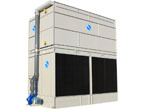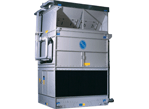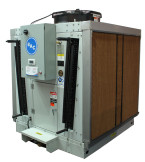For more than 80 years, our strong history of innovation and focus on changing trends has established BAC as a leader in sustainable cooling across HVAC, Industrial, and Refrigeration markets globally.
We are focused on improving energy efficiency, reducing our impact across the product's lifecycle, expanding water saving options, and harnessing the power of intelligent controls.
Energy efficiency
 The rising costs of energy and the drive to be green are resulting in greater demand for energy efficiency and energy conservation. The energy savings potential of evaporative cooling makes it attractive for use, in particular for larger cooling needs. Evaporative cooling is all-natural, using water as the cooling medium, and air, to efficiently dissipate heat. Water has a higher heat capacity than air, so it is able to carry more heat per unit mass than air. Energy consumed by an HVAC system may account for up to 50% of a facility's total electricity consumption. Switching to water cooled system reduces energy usage by 30%. The lower energy consumption reduces scope 2 greenhouse gas emissions, associated with electricity generation.
The rising costs of energy and the drive to be green are resulting in greater demand for energy efficiency and energy conservation. The energy savings potential of evaporative cooling makes it attractive for use, in particular for larger cooling needs. Evaporative cooling is all-natural, using water as the cooling medium, and air, to efficiently dissipate heat. Water has a higher heat capacity than air, so it is able to carry more heat per unit mass than air. Energy consumed by an HVAC system may account for up to 50% of a facility's total electricity consumption. Switching to water cooled system reduces energy usage by 30%. The lower energy consumption reduces scope 2 greenhouse gas emissions, associated with electricity generation.
Water saving
 Our products use water which is a valuable resource and needs to be managed responsibly. In some regions, water efficiency and water savings become increasingly important. To support our customers to meet their water management goals, we have developed special coatings such as Baltibond® and TriArmor® to reduce water and chemical usage by up to 30%, due to the unit's ability to run with higher cycles of concentration. Further BAC has pioneered the development of water saving technologies which utilize an optimal combination of dry and wet operation tailored to local conditions.
Our products use water which is a valuable resource and needs to be managed responsibly. In some regions, water efficiency and water savings become increasingly important. To support our customers to meet their water management goals, we have developed special coatings such as Baltibond® and TriArmor® to reduce water and chemical usage by up to 30%, due to the unit's ability to run with higher cycles of concentration. Further BAC has pioneered the development of water saving technologies which utilize an optimal combination of dry and wet operation tailored to local conditions.
Natural refrigerants
 BAC evaporative and adiabatic condensers are used in refrigeration systems at breweries, food processing plants, cold storage warehouses, and other places. The phasing out of CFC-based refrigerants in various regions around the world, is boosting the use of ammonia, CO2 and hybrid refrigerant systems for versatile applications. Natural refrigerants like ammonia and CO2 have no ozone depletion potential and either no global warming potential or their global warming potential is negligibly low. Furthermore, these systems today operate with just the same energy efficiency as systems with synthetic refrigerants.
BAC evaporative and adiabatic condensers are used in refrigeration systems at breweries, food processing plants, cold storage warehouses, and other places. The phasing out of CFC-based refrigerants in various regions around the world, is boosting the use of ammonia, CO2 and hybrid refrigerant systems for versatile applications. Natural refrigerants like ammonia and CO2 have no ozone depletion potential and either no global warming potential or their global warming potential is negligibly low. Furthermore, these systems today operate with just the same energy efficiency as systems with synthetic refrigerants.
Recycled materials
BAC manufactures its equipment with up to two thirds recycled content. The materials include steel in structures, PVC for fill and piping, aluminum sheaves and copper windings in electric motors.
For more information about our efforts, targets and accomplishments, read our ESG report.
